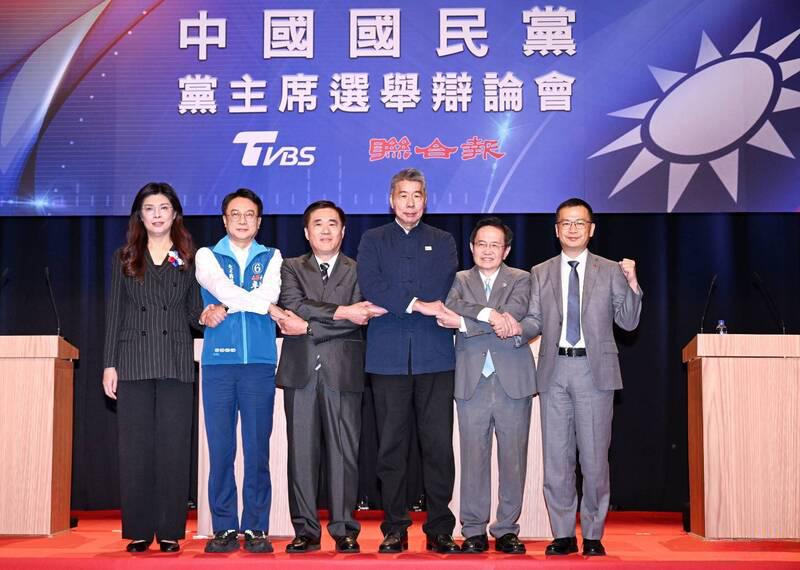Candidates for Chinese Nationalist Party (KMT) chairperson yesterday focused on cross-strait issues during a televised policy debate ahead of the election on Oct. 18.
Six candidates are to run in the election to replace outgoing KMT Chairman Eric Chu (朱立倫).
Former Taipei mayor Hau Lung-bin (郝龍斌), Sun Yat-sen School president Chang Ya-chung (張亞中), KMT Legislator Lo Chih-chiang (羅智強), former KMT lawmaker Cheng Li-wun (鄭麗文), former Changhua County commissioner Cho Po-yuan (卓伯源) and former National Assembly representative Tsai Chih-hong (蔡志弘) last night took part in their first debate, cohosted by United Daily News and TVBS News.

Photo: Fang Pin-chao, Taipei Times
Cheng said that China and Taiwan have to reconcile, cooperate and stop hurting each other to create a foundation for peace for the next 100 years.
She would unite Taiwanese in saying no to independence, the "two states" theory (兩國論) and the ruling Democratic Progressive Party, which is attempting to ignite war and betray Taiwan, she said.
Chang said that unification is not about annexation, but creating a better future together.
The DPP’s pro-independence stance would certainly lead to unification by force, he said.
If the KMT continues to maintain the “status quo,” China would resort to the use of force to unify with Taiwan and apply its “one country, two systems” formula, Chang said.
Moving toward peace and unification is the only way to ensure Taiwan’s security, he said.
Lo said that the KMT’s cross-strait policy would stand the test of time, adding that the “1992 consensus” was a success in the past and would continue to succeed.
The “1992 consensus” — a term that former Mainland Affairs Council chairman Su Chi (蘇起) in 2006 admitted making up in 2000 — refers to a tacit understanding between the KMT and the Chinese Communist Party that both sides of the Taiwan Strait acknowledge that there is “one China,” with each side having its own interpretation of what “China” means.
Meanwhile, Hau said that maintaining equal friendship with the US and China, while not appeasing either of them would best serve Taiwan’s interests.
Taiwan should promote cross-strait exchanges under the premise of the “1992 consensus,” while China should respect the existence of the Republic of China, he said, using Taiwan's formal name.
Cho proposed “one China” and the rejuvenation of Chinese culture.
The two sides of the Taiwan Strait should share the same, undivided, sovereignty, with each side not denying the other, coexisting and prospering, Cho said.
The best way for Taiwan to deal with the predicament with China would be for the UN to move its headquarters to Taiwan, he said, adding that this would turn Taiwan from a focal point of regional conflict to a starting point for world peace.
Cho said that he would invite Chinese President Xi Jinping (習近平) and US President Donald Trump to visit Taiwan together to discuss the relocation of the UN’s headquarters.
Tsai proposed a “Two-Five Understanding,” calling for mutual understanding under the "one China" principle to resolve the cross-strait deadlock.

The manufacture of the remaining 28 M1A2T Abrams tanks Taiwan purchased from the US has recently been completed, and they are expected to be delivered within the next one to two months, a source said yesterday. The Ministry of National Defense is arranging cargo ships to transport the tanks to Taiwan as soon as possible, said the source, who is familiar with the matter. The estimated arrival time ranges from late this month to early next month, the source said. The 28 Abrams tanks make up the third and final batch of a total of 108 tanks, valued at about NT$40.5 billion

Two Taiwanese prosecutors were questioned by Chinese security personnel at their hotel during a trip to China’s Henan Province this month, the Mainland Affairs Council (MAC) said yesterday. The officers had personal information on the prosecutors, including “when they were assigned to their posts, their work locations and job titles,” MAC Deputy Minister and spokesman Liang Wen-chieh (梁文傑) said. On top of asking about their agencies and positions, the officers also questioned the prosecutors about the Cross-Strait Joint Crime-Fighting and Judicial Mutual Assistance Agreement, a pact that serves as the framework for Taiwan-China cooperation on combating crime and providing judicial assistance, Liang

A group from the Taiwanese Designers in Australia association yesterday represented Taiwan at the Midsumma Pride March in Melbourne. The march, held in the St. Kilda suburb, is the city’s largest LGBTQIA+ parade and the flagship event of the annual Midsumma Festival. It attracted more than 45,000 spectators who supported the 400 groups and 10,000 marchers that participated this year, the association said. Taiwanese Designers said they organized a team to march for Taiwan this year, joining politicians, government agencies, professionals and community organizations in showing support for LGBTQIA+ people and diverse communities. As the first country in Asia to legalize same-sex

MOTIVES QUESTIONED The PLA considers Xi’s policies toward Taiwan to be driven by personal considerations rather than military assessment, the Epoch Times reports Chinese President Xi Jinping’s (習近平) latest purge of the Chinese People’s Liberation Army (PLA) leadership might have been prompted by the military’s opposition to plans of invading Taiwan, the Epoch Times said. The Chinese military opposes waging war against Taiwan by a large consensus, putting it at odds with Xi’s vision, the Falun Gong-affiliated daily said in a report on Thursday, citing anonymous sources with insight into the PLA’s inner workings. The opposition is not the opinion of a few generals, but a widely shared view among the PLA cadre, the Epoch Times cited them as saying. “Chinese forces know full well that